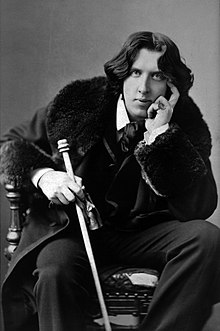On May 25, 1895, Oscar Wilde is sentenced to two years hard labor for committing
homosexual acts. Wilde was one
of the most successful playwrights of the 1880s and 1890s. Today he is remembered for his only novel The Picture of Dorian Gray, his plays
and the circumstances of his imprisonment which was followed by his early
death. Born on October 16, 1854 in Dublin, Ireland, his parents were successful
Dublin intellectuals. Their son became fluent in French and German early in
life. Oscar proved himself to be an outstanding student and studied at Oxford.
He became known for his involvement in the rising philosophy of aestheticism. After
university, Wilde moved to London into fashionable cultural and social circles.
He tried his hand at various literary activities, published a book of poems, and
lectured in the United States and Canada on the new "English Renaissance
in Art", and then returned to London where he worked prolifically as a
journalist. Known for his biting wit, flamboyant dress and glittering
conversation, Wilde became one of the best-known personalities of his day.
At the turn of
the 1890s, he refined his ideas about the supremacy of art in a series of
dialogues and essays, and incorporated themes of decadence, duplicity, and
beauty into his only novel, The Picture
of Dorian Gray (1890). He also produced comedic plays in the early 1890s,
which made him one of the most successful playwrights of late Victorian London.
At the height of his fame and success, while his masterpiece, The Importance of
Being Earnest (1895), was still on stage in London, Wilde was prosecuted for libel.
And the charge carried a penalty of up to two years in prison. The trial
unearthed evidence that caused Wilde to be arrested and charged with gross
indecency with other men. On May 24, 1895, he was convicted and imprisoned for
two years. In 1897, while in prison, he wrote De Profundis (1905), a long letter which discusses his spiritual
journey through his trials, forming a dark counterpoint to his earlier
philosophy of pleasure. Upon his release from jail he left immediately for
France, never to return to Ireland or Britain. There he wrote his last work, The Ballad of Reading Gaol (1898), a
long poem commemorating the harsh rhythms of prison life. He died on November
30, 1900 in Paris and was buried at Pere Lachaise Cemetery.
Michael Thomas Barry is the author of Great Britain’s Literary Legends.
The book can be purchased through Amazon at the following links:



No comments:
Post a Comment